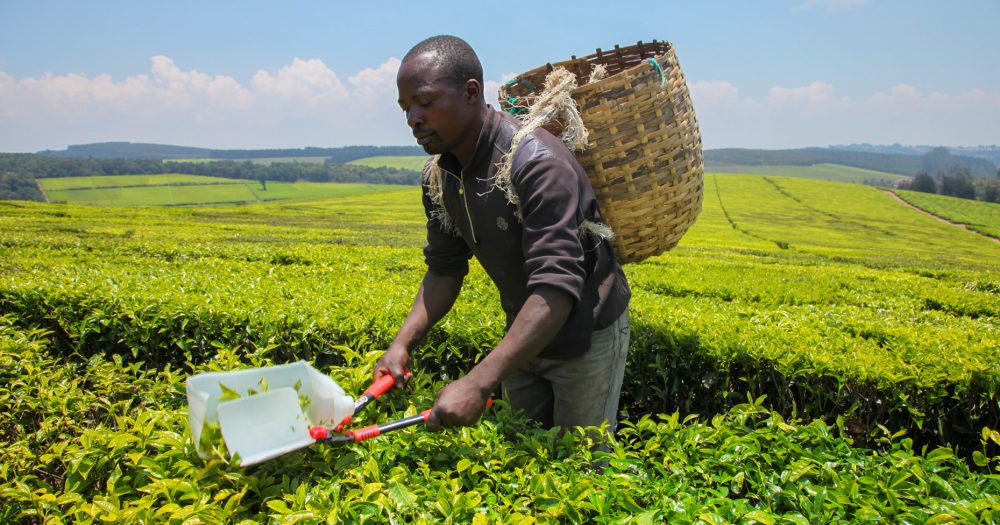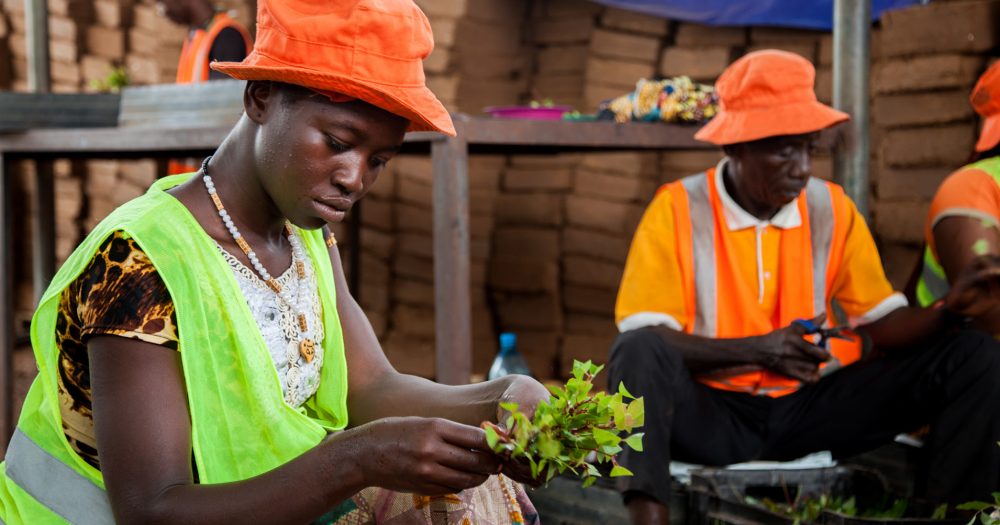Our investment
Description of the investment.
Description of the investment.
The $75 million green basket bond will finance small-scale green projects and businesses, funded through micro, small & medium enterprise (MSME) banks across Africa, South and South-East Asia. An additional $520,000 will also be provided by our technical assistance facility to enable these MSME banks to better support the growth of the green projects and businesses.
The innovative, multi-currency green lending programme is the first of its kind in the markets we invest in. It is expected to set a new market standard and help scale climate finance across Asia and Africa. It will support increased access to credit for green projects and support a catalysing role in enabling proof of concept of the green basket bond structure. This will potentially lead to the development of the green lending market at the MSME level in the long-term by attracting other investors.
Impact information
Applies to investments made from 2019 onwards. The tabs in this section define what we expect to achieve through the investment, assessing the potential impact of the investment against six dimensions of impact. You can find more details on our methodology of assessing impact here.
Applies to investments made from 2019 onwards. The tabs in this section define what we expect to achieve through the investment, assessing the potential impact of the investment against six dimensions of impact. You can find more details on our methodology of assessing impact here.
What?
| Impact |
|---|
|
|
|
How?
| Primary | Secondary |
|---|---|
|
|
Who?
| Stakeholder | Geography | Characteristics |
|---|---|---|
| Planet |
Global. Africa (min. 30 per cent), India (up to 25 per cent), South Asia (Pakistan, Bangladesh, Sri Lanka, Nepal – min. 25 per cent), and Indo-Pacific markets (up to 20 per cent). |
Projects can span renewable energy, energy efficiency, clean transportation, green buildings, agri./forestry/land use. Countries are varied in terms of impact: (i) eligible geographies include countries such as India and Indonesia that are among the top 10 largest emitters of greenhouse gas emissions globally (SDG 13), (ii) eligible geographies also include countries in sub-Saharan Africa which continues to be the region with the highest rate of energy poverty globally. |
How much?
| Scale | Depth/Duration |
|---|---|
|
We expect to reach 10-15 underlying financial institutions through the bond. |
|
Contribution/additionality
| Contribution/additionality |
|---|
|
Risk
Alignment Risk
Execution Risk
|
Impact score
|
Impact score (at point of investment)
The Impact Score is a tool to help us manage our performance against our strategic impact objectives. It is designed to incentivise investments that support our productive, sustainable, and inclusive objectives. You can find out more here. The Impact Score is published for investments made from 2022 onwards. The Impact Scores are calculated at the point of investment. We publish the Impact Scores of new investments annually, once the information has been externally assured by an independent third party. |
|---|
9 |
Environmental and social information
-
Environmental and social summary
A high-level description of the environmental and social aspects of the investment. This may include a summary of key environmental and social risks identified during environmental and social due diligence (ESDD); key elements of an environmental and social action plan (ESAP); or ways in which we plan to support the investee improve environmental and social standards, such as through their environmental and social management system (ESMS); as well as any other priority areas agreed with the investee.
-
Environmental and social risk
A risk category rating, which indicates the level of environmental and social risk associated with an investment. For an explanation of the categorisations used, see here. We consistently provide an environmental and social risk category for all investments screened from 2023 onwards.
Environmental and social summary
We agreed on an ESAP which focuses on the implementation of an ESMS. This will help Symbiotics to systematically undertake ESDD and monitoring of the underlying assets, and to broaden environmental and social capacity within the team.
Environmental and social risk
Medium-High
Reporting and Complaints Mechanism
The Reporting and Complaints Mechanism allows anyone outside BII to report alleged breaches of the business integrity or environmental and social provisions of BII’s Policy on Responsible Investing. This includes breaches made by BII, a BII investee, or a portfolio company of a fund in which BII has invested. The Reporting and Complaints Mechanism Rules are available here. Reports and complaints can be submitted by email to reportsandcomplaints@bii.co.uk or by mail. See more details on our Reporting and Complaints Mechanism here.
For any other general enquiries contact us at enquiries@bii.co.uk
-
Key facts
- Last updated
:
When the last quarterly update of the website database occurred.
- March 2025
- Project number
:
An identifier number shared by investments in the same project.
- D5095
- Status
:
The current status of the investment (green flag for active and red flag for exited).
- Active
- Region
:
The geographical region where the country is located. We currently invest in Africa, South Asia, South East Asia and the Caribbean. In 2023, BII’s investment mandate was extended allowing it to invest in regional funds linked to Ukraine, with the majority of activity expected to begin post-war. Investments outside these regions were made prior to 2012 under previous investment mandates.
- East Africa, Global, North Africa, South Asia, Southeast Asia, Southern Africa
- Sector
:
We prioritise those sectors that facilitate development and need our capital the most. Our priority sectors contribute towards many of the Sustainable Development Goals. They range from investing in the power infrastructure that will provide people with better access to electricity, to investing in financial institutions that direct capital to the individuals and businesses that need it the most.
- Financial services
- Investment type :
- Fund
- Start date :
- May 2022
- Amount :
- $75m
- Currency of investment :
- USD
- Fund manager:
- Symbiotics
- Domicile
:
The company or investment fund’s place of incorporation.
- Switzerland
We provide capital in the following ways: directly – through direct equity, direct debt, guarantees and other non-intermediated financial instruments; and indirectly – principally through investment funds.
For direct investments and fund investments, this is the date BII committed capital to the investments. This is typically the date on which legal agreements are signed by all parties.
For the portfolio companies of our fund investments, this is the date (either the month or the quarter) on which the fund committed capital to the portfolio company.
For direct equity investments, this is the date at which British International Investment exited the investment.
For debt investments, this is the date at which the final debt repayment was made.
For funds, this is the date at which the fund was terminated.
For underlying fund investments, this is the date at which the fund manager exited the investment.
The total amount committed, per financial instrument, per investment, on the date BII becomes subject to a binding legal obligation to provide funding or assume a contingent liability. This information is provided in US dollars.
For direct investments, this is the amount that BII has committed to the business or project. For fund investments, this is the amount BII has committed to the fund.
The currency in which the investment was made.
- Climate finance
:
Indicates whether the investment is climate finance qualified or partially climate finance qualified and the type of climate finance (adaptation, mitigation or both). We define climate finance using the multilateral development bank (MDB) and the International Development Finance Club (IDFC) Common Principles climate finance methodology. See Common Principles for Climate Mitigation Finance Tracking and Common Principles for Climate Change Adaptation Finance Tracking. We provide the climate finance qualification and type for commitments from 2020 onwards, which is when we launched our Climate Change Strategy.
- Fully qualified
- Climate finance type
:
Mitigation: Indicates investments which, by avoiding or reducing GHG emissions or increasing GHG sequestration, contributes substantially to the stabilisation of GHG concentrations in the atmosphere – at a level which prevents dangerous anthropogenic interference with the climate system consistent with the long-term temperature goal of the Paris Agreement
Adaptation: Indicates investments aimed at preventing or reducing the risks or vulnerabilities posed by climate change and increasing climate resilience. This includes both adapted activities and enabling activities to manage and reduce physical climate risks
Dual: Indicates investments directed towards activities contributing to both climate change mitigation and climate change adaptation and meeting the respective criteria for each category
The climate finance type of the investment is determined at time of commitment.
-
- Mitigation
- Last updated
Investments made by this fund into companies:
For further information about these companies, visit https://symbioticsgroup.com/
| Investment name | Country | Region | Sector | Energy Type | Start date | Status |
|---|---|---|---|---|---|---|
| AMK | Cambodia | Rest of the World | Financial services | March 2023 | Active | |
| Ecofy Finance Private Limited | India | South Asia | Financial services | December 2024 | Active | |
| EVN Finance Joint Stock Company | Vietnam | Rest of the World | Financial services | November 2022 | Active | |
| Middle East Bank Kenya Ltd. | Kenya | East Africa | Financial services | May 2023 | Active | |
| Mufin Green Finance Limited | India | South Asia | Financial services | February 2023 | Active | |
| Namdev Finvest Private Limited | India | South Asia | Financial services | September 2022 | Active | |
| Norsad Capital Limited | Botswana | Southern Africa | Financial services | February 2023 | Exited | |
| Prabhu Bank Ltd. | Nepal | South Asia | Financial services | June 2023 | Active | |
| Pubali Bank Ltd. | Bangladesh | South Asia | Financial services | April 2023 | Active | |
| Samunnati Financial Intermediation | India | South Asia | Financial services | August 2022 | Active | |
| Sunrise Bank Ltd. | Nepal | South Asia | Financial services | June 2023 | Active | |
| Tunisie Leasing & Factoring (TLF) | Tunisia | North Africa | Financial services | April 2023 | Active |


